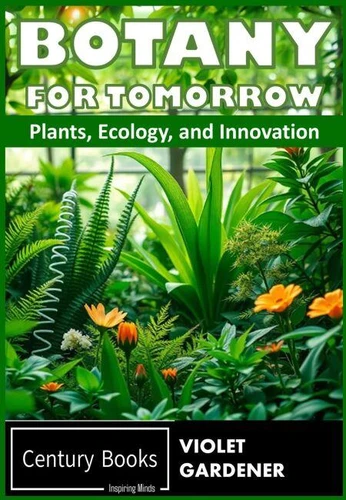Botany for Tomorrow: Plants, Ecology, and Innovation is an essential guide to the world of plants, delving deeply into the fascinating science of botany and its applications in a changing world. This comprehensive volume explores the biological, ecological, and technological aspects of plants, offering readers insights into everything from plant cell structure to complex ecological relationships and the cutting-edge innovations shaping the future of plant science.
Each chapter provides a blend of foundational knowledge and applied science, covering topics such as plant physiology, genetics and biotechnology, conservation strategies, and sustainable agricultural practices. Rich in detail and accessible to readers of various backgrounds, the book includes case studies, practical experiments, and detailed plant profiles to bring the science of plants to life. Whether understanding the latest advancements in CRISPR gene editing, exploring urban greening and green infrastructure, or examining the role of plants in mitigating climate change, readers will find themselves immersed in both the science and the societal importance of plants.
Designed for students, educators, professionals, and plant enthusiasts, Botany for Tomorrow equips readers with the tools to understand and engage with the role of plants in addressing global challenges, from food security to biodiversity loss. As we look toward the future, this book provides an inspiring, science-backed perspective on the indispensable role of plants in our world-and how their study can lead to sustainable solutions for generations to come.
Botany for Tomorrow: Plants, Ecology, and Innovation is an essential guide to the world of plants, delving deeply into the fascinating science of botany and its applications in a changing world. This comprehensive volume explores the biological, ecological, and technological aspects of plants, offering readers insights into everything from plant cell structure to complex ecological relationships and the cutting-edge innovations shaping the future of plant science.
Each chapter provides a blend of foundational knowledge and applied science, covering topics such as plant physiology, genetics and biotechnology, conservation strategies, and sustainable agricultural practices. Rich in detail and accessible to readers of various backgrounds, the book includes case studies, practical experiments, and detailed plant profiles to bring the science of plants to life. Whether understanding the latest advancements in CRISPR gene editing, exploring urban greening and green infrastructure, or examining the role of plants in mitigating climate change, readers will find themselves immersed in both the science and the societal importance of plants.
Designed for students, educators, professionals, and plant enthusiasts, Botany for Tomorrow equips readers with the tools to understand and engage with the role of plants in addressing global challenges, from food security to biodiversity loss. As we look toward the future, this book provides an inspiring, science-backed perspective on the indispensable role of plants in our world-and how their study can lead to sustainable solutions for generations to come.


